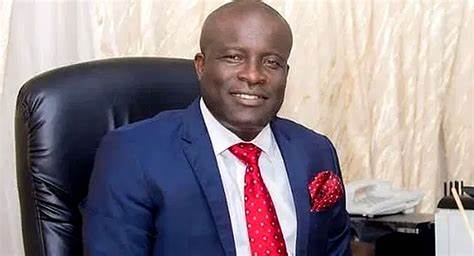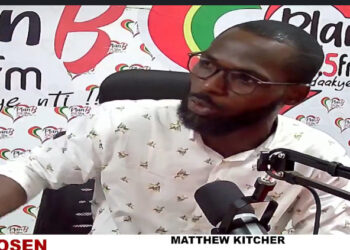In a recent post-election interview on Adom FM/TV, Daniel Nii Kwartei Titus Glover, the Greater Accra Regional Minister, blamed the media for the New Patriotic Party’s (NPP) defeat in the region. Glover, who previously served as the Member of Parliament for Tema East, criticized the media for what he described as biased and negative coverage of the NPP. He argued that certain media outlets launched campaigns that worked against the party’s electoral prospects, playing a significant role in the party’s loss (3news).
While acknowledging that several factors contributed to the NPP’s defeat, Glover made it clear that the media’s role in shaping public opinion was crucial. He pointed out that a large number of media stations are based in Accra, and he expressed concern over the tendency of some outlets to be overly critical of the government. According to Glover, some media houses did not provide fair or balanced reporting and instead focused on highlighting the shortcomings of the NPP and its policies, which in turn negatively affected the party’s chances at the polls.
Glover specifically mentioned how the media coverage of certain issues, such as illegal mining (galamsey), contributed to the NPP’s electoral challenges. He referred to Joy FM’s coverage just two days before the election, where the station focused on the galamsey issue amidst fierce criticisms of the government. Glover claimed that this kind of reporting indirectly worked against the NPP by portraying the government in a negative light right before voters went to the polls. He suggested that this kind of media focus could have influenced voter perceptions and contributed to the party’s loss.
This reflection on the media’s impact on the election is part of Glover’s broader analysis of the NPP’s performance in the region. He expressed concern that some media outlets seemed to have an agenda that went beyond reporting the facts, actively shaping the political discourse in a way that was detrimental to the party’s image. Glover’s comments underline the powerful role that the media plays in shaping public opinion and influencing electoral outcomes, particularly in an age where media coverage can make or break a political party’s chances in an election.
In conclusion, Glover’s post-election analysis underscores the complex relationship between politics and media, highlighting how negative press coverage can have far-reaching consequences on the fortunes of political parties. He believes that had the media been more supportive, the NPP might have fared better in the Greater Accra region.
In a recent post-election interview on Adom FM/TV, Daniel Nii Kwartei Titus Glover, the Greater Accra Regional Minister, blamed the media for the New Patriotic Party’s (NPP) defeat in the region. Glover, who previously served as the Member of Parliament for Tema East, criticized the media for what he described as biased and negative coverage of the NPP. He argued that certain media outlets launched campaigns that worked against the party’s electoral prospects, playing a significant role in the party’s loss (3news).
While acknowledging that several factors contributed to the NPP’s defeat, Glover made it clear that the media’s role in shaping public opinion was crucial. He pointed out that a large number of media stations are based in Accra, and he expressed concern over the tendency of some outlets to be overly critical of the government. According to Glover, some media houses did not provide fair or balanced reporting and instead focused on highlighting the shortcomings of the NPP and its policies, which in turn negatively affected the party’s chances at the polls.
Glover specifically mentioned how the media coverage of certain issues, such as illegal mining (galamsey), contributed to the NPP’s electoral challenges. He referred to Joy FM’s coverage just two days before the election, where the station focused on the galamsey issue amidst fierce criticisms of the government. Glover claimed that this kind of reporting indirectly worked against the NPP by portraying the government in a negative light right before voters went to the polls. He suggested that this kind of media focus could have influenced voter perceptions and contributed to the party’s loss.
This reflection on the media’s impact on the election is part of Glover’s broader analysis of the NPP’s performance in the region. He expressed concern that some media outlets seemed to have an agenda that went beyond reporting the facts, actively shaping the political discourse in a way that was detrimental to the party’s image. Glover’s comments underline the powerful role that the media plays in shaping public opinion and influencing electoral outcomes, particularly in an age where media coverage can make or break a political party’s chances in an election.
In conclusion, Glover’s post-election analysis underscores the complex relationship between politics and media, highlighting how negative press coverage can have far-reaching consequences on the fortunes of political parties. He believes that had the media been more supportive, the NPP might have fared better in the Greater Accra region.
In a recent post-election interview on Adom FM/TV, Daniel Nii Kwartei Titus Glover, the Greater Accra Regional Minister, blamed the media for the New Patriotic Party’s (NPP) defeat in the region. Glover, who previously served as the Member of Parliament for Tema East, criticized the media for what he described as biased and negative coverage of the NPP. He argued that certain media outlets launched campaigns that worked against the party’s electoral prospects, playing a significant role in the party’s loss (3news).
While acknowledging that several factors contributed to the NPP’s defeat, Glover made it clear that the media’s role in shaping public opinion was crucial. He pointed out that a large number of media stations are based in Accra, and he expressed concern over the tendency of some outlets to be overly critical of the government. According to Glover, some media houses did not provide fair or balanced reporting and instead focused on highlighting the shortcomings of the NPP and its policies, which in turn negatively affected the party’s chances at the polls.
Glover specifically mentioned how the media coverage of certain issues, such as illegal mining (galamsey), contributed to the NPP’s electoral challenges. He referred to Joy FM’s coverage just two days before the election, where the station focused on the galamsey issue amidst fierce criticisms of the government. Glover claimed that this kind of reporting indirectly worked against the NPP by portraying the government in a negative light right before voters went to the polls. He suggested that this kind of media focus could have influenced voter perceptions and contributed to the party’s loss.
This reflection on the media’s impact on the election is part of Glover’s broader analysis of the NPP’s performance in the region. He expressed concern that some media outlets seemed to have an agenda that went beyond reporting the facts, actively shaping the political discourse in a way that was detrimental to the party’s image. Glover’s comments underline the powerful role that the media plays in shaping public opinion and influencing electoral outcomes, particularly in an age where media coverage can make or break a political party’s chances in an election.
In conclusion, Glover’s post-election analysis underscores the complex relationship between politics and media, highlighting how negative press coverage can have far-reaching consequences on the fortunes of political parties. He believes that had the media been more supportive, the NPP might have fared better in the Greater Accra region.
In a recent post-election interview on Adom FM/TV, Daniel Nii Kwartei Titus Glover, the Greater Accra Regional Minister, blamed the media for the New Patriotic Party’s (NPP) defeat in the region. Glover, who previously served as the Member of Parliament for Tema East, criticized the media for what he described as biased and negative coverage of the NPP. He argued that certain media outlets launched campaigns that worked against the party’s electoral prospects, playing a significant role in the party’s loss (3news).
While acknowledging that several factors contributed to the NPP’s defeat, Glover made it clear that the media’s role in shaping public opinion was crucial. He pointed out that a large number of media stations are based in Accra, and he expressed concern over the tendency of some outlets to be overly critical of the government. According to Glover, some media houses did not provide fair or balanced reporting and instead focused on highlighting the shortcomings of the NPP and its policies, which in turn negatively affected the party’s chances at the polls.
Glover specifically mentioned how the media coverage of certain issues, such as illegal mining (galamsey), contributed to the NPP’s electoral challenges. He referred to Joy FM’s coverage just two days before the election, where the station focused on the galamsey issue amidst fierce criticisms of the government. Glover claimed that this kind of reporting indirectly worked against the NPP by portraying the government in a negative light right before voters went to the polls. He suggested that this kind of media focus could have influenced voter perceptions and contributed to the party’s loss.
This reflection on the media’s impact on the election is part of Glover’s broader analysis of the NPP’s performance in the region. He expressed concern that some media outlets seemed to have an agenda that went beyond reporting the facts, actively shaping the political discourse in a way that was detrimental to the party’s image. Glover’s comments underline the powerful role that the media plays in shaping public opinion and influencing electoral outcomes, particularly in an age where media coverage can make or break a political party’s chances in an election.
In conclusion, Glover’s post-election analysis underscores the complex relationship between politics and media, highlighting how negative press coverage can have far-reaching consequences on the fortunes of political parties. He believes that had the media been more supportive, the NPP might have fared better in the Greater Accra region.










Discussion about this post